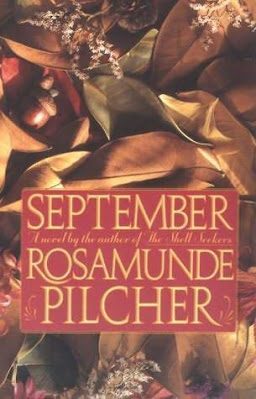September by Rosamunde Pilcher
Fiction
1990
Finished on September 12, 2024
Rating: 4.5/5 (Very Good)
50 years is a long way to look ahead, but looking back it doesn’t seem any time at all. Makes you wonder what life’s all about.
Publisher's Blurb:
Perhaps once in a generation, a novel seemingly comes out of nowhere and explodes onto the bestseller lists. Such a book was Rosamunde Pilcher's The Shell Seekers. With well over the three million copies sold in the U.S. and Canada, and close to four million worldwide, it was a publishing phenomenon, on national bestseller lists for two years!
An audience of millions has awaited Rosamunde Pilcher's new novel, and with September they will not be disappointed. Rich and involving, it teems with memorable and above all human characters coping with universal human difficulties and experiences. Set in Mrs. Pilcher's native Scotland, the novel begins in May as invitations are being written for a party in September. September is an extraordinary month in Scotland, when a brief but glorious summer is ending and the long, gray winter has yet to begin. It is a time of almost frenzied rounds of parties and houseguests and reels. September is a month when marriage is proposed and marriages break up, when even normally reticent Scots, Londoners, and Americans drink a little too much, dance a little too late into the night, when promised are made, hearts are broken, and long-buried family secrets can come to light.
With consummate skill, Rosamunde Pilcher draws more than a dozen major characters from London, New York, Scotland, and Spain to the little town of Strathcroy. The occasion is to be a twenty-first birthday party, but as May becomes June and the summer commences, the reader can almost feel the tug of inexorable fate propelling Pilcher's marvelous characters to their inevitable--and often surprising--destinies.
September is a novel to be savored, a curl-up-under-the-covers kind of old-fashioned read hardly anyone knows how to write anymore. It is a book to be savored and cherished--not just in September, but in any month of any year.
Earlier this year, two of my blogging friends and I decided on a buddy-read of Rosamunde Pilcher's hefty novel, September. We didn't start reading it in the month of September, but close enough! This was my second reading of the novel, but most (if not all!) of the details were long forgotten from that first encounter. I read the hardcover edition that I purchased many years ago, and discovered that books over five hundred pages are very difficult to read in bed. I was tempted to download the audio version, but felt more inclined to read the print edition, so I toughed it out.
As mentioned in the publisher's blurb, Pilcher peoples this particular novel with numerous characters, and I was forced to start a cheat sheet with each character's traits and relationships to others in the story. As one would expect, it wasn't long before I no longer needed to glance at that list, but it did come in handy during the early chapters.
Readers familiar with Rosamunde Pilcher's works know what a comfortable reading experience she brings to the page. Her descriptions of the homes, as well as the surrounding locations, are rich with domestic details, making this reader consider a trip to Scotland.
As Isobel, worn out with the daily demands of her busy life, retreated from time to time to the linen room, so her husband found solace in his workshop. This was the basement of Croy, an area of stone-flagged passages and dimly lighted cellars. The old boiler lived down here, a brooding, smelly monster that looked large enough to drive a liner, and demanded constant and regular attention and enormous quantities of coke. As well, one or two other rooms were still employed —to store unused china, unwanted items of furniture, the coal and the logs and a much-diminished wine cellar. But mostly, the basement stood deserted, hung with cobwebs, and invaded each year by families of field mice.
And
Sunday morning. Overcast, very still, very quiet, hushed with the weekly inertia of a Scottish Sabbath. It had rained during the night, leaving puddles by the roadside and gardens dripping with moisture. In Strathcroy, cottages slumbered, curtains stayed drawn. Slowly the occupants stirred, rose, opened doors, lit fires, made cups of tea. Plumes of peat-smoke rose, straight, from chimney-pots. Dogs were walked, hedges clipped, cars washed. Mr. Ishak opened up his shop for the sale of morning rolls, milk, cigarettes, Sunday newspapers, and any other commodity that a family might need to get through the empty day. From the tower of the Presbyterian church, the bell tolled.
In addition to September, I have read all of Pilcher's full-length novels (The Shell Seekers, Winter's Solstice, and Coming Home) at least once, as well as several of her novellas. I prefer her longer novels to her shorter works, and will most likely re-read the former again in the coming years.
Thanks for the nudge, JoAnn and Tina, to read this family saga once again. While not my favorite (that may be Coming Home or Winter's Solstice), it didn't disappoint! A satisfying read. Highly recommend!




.jpg)



